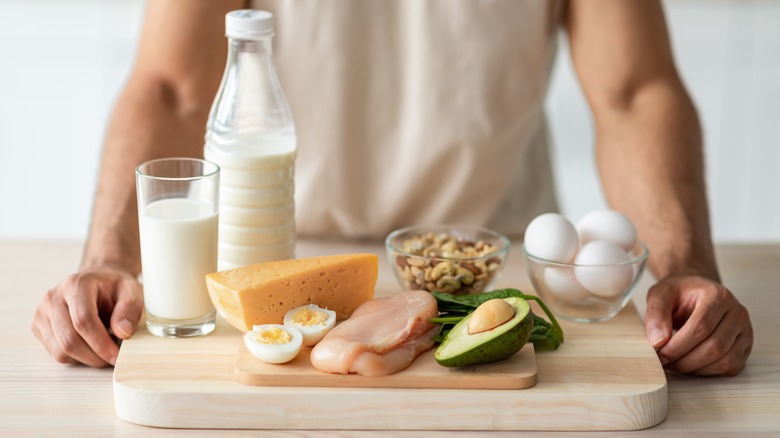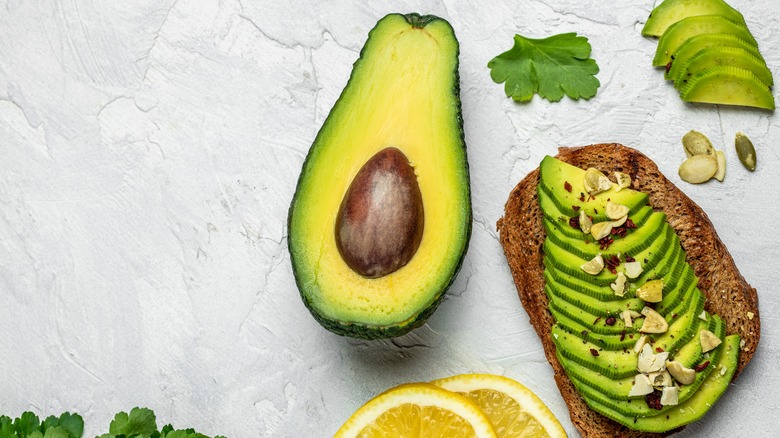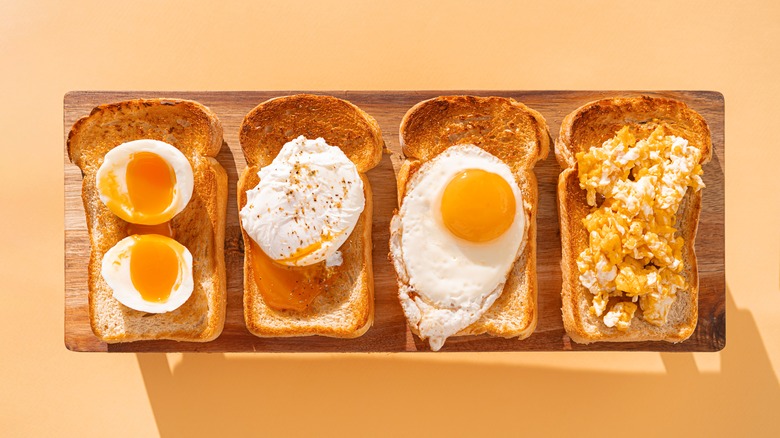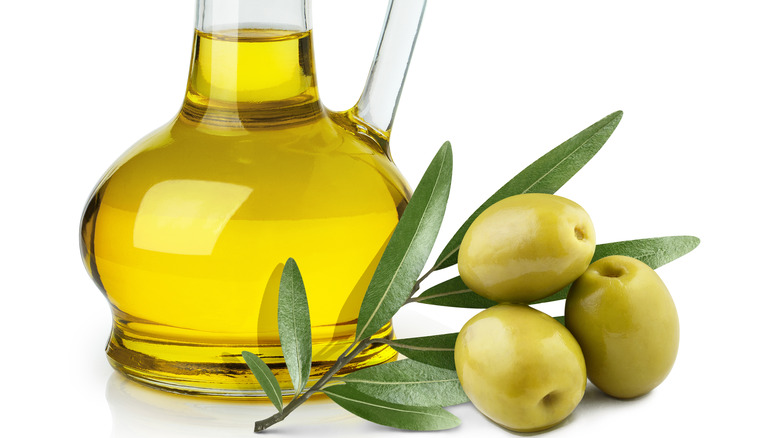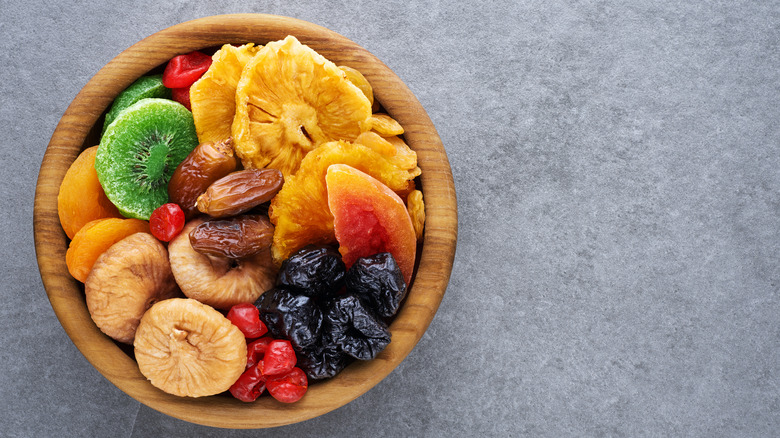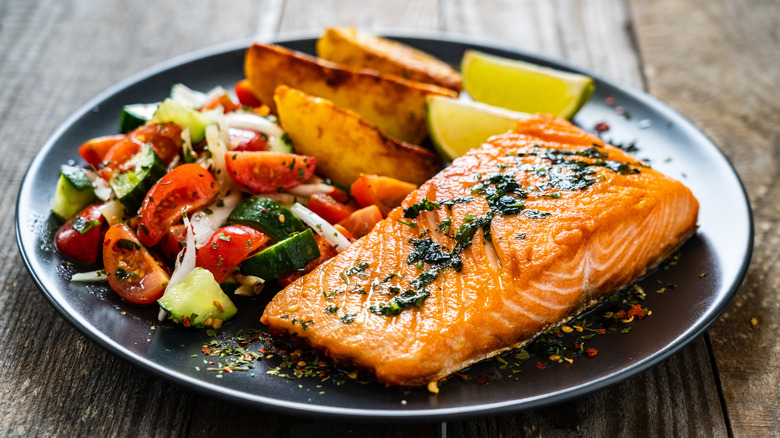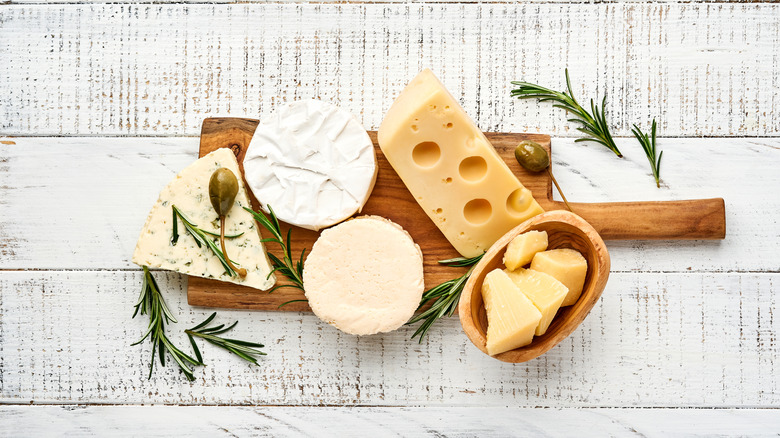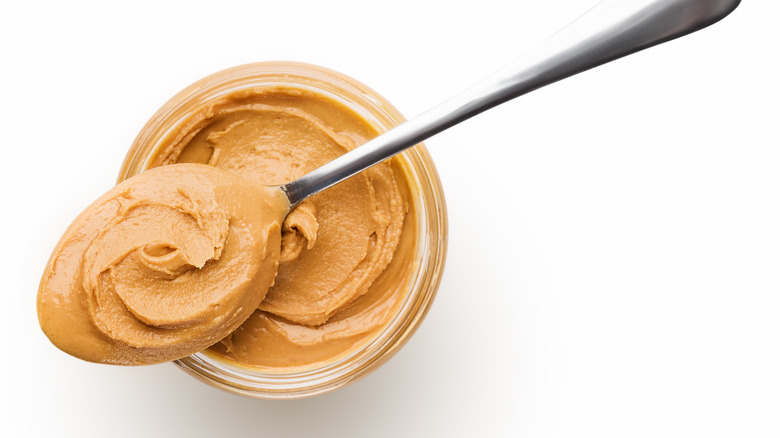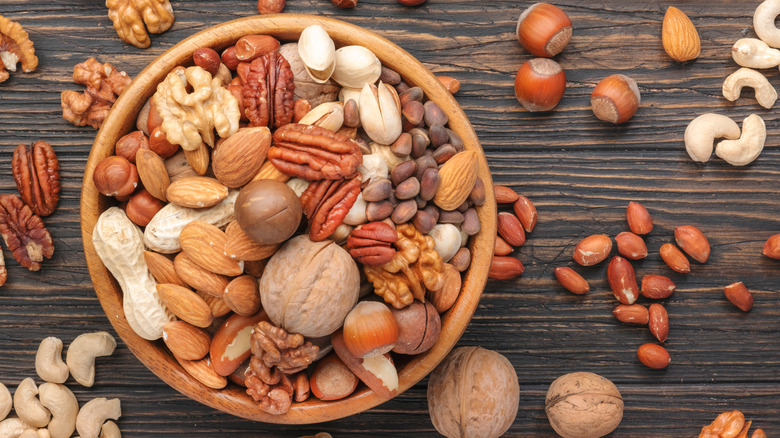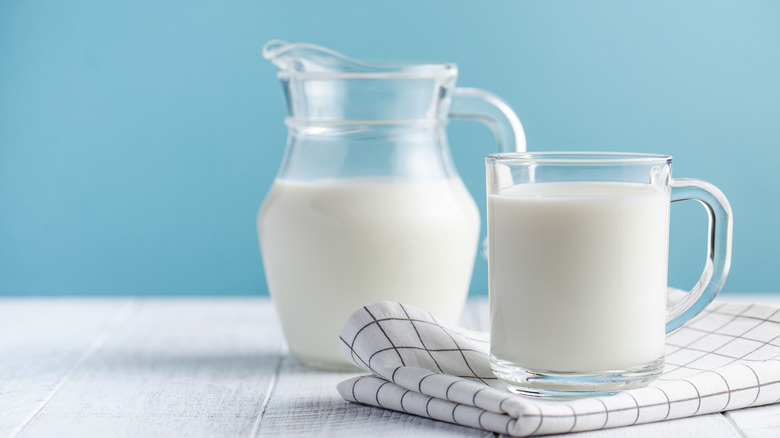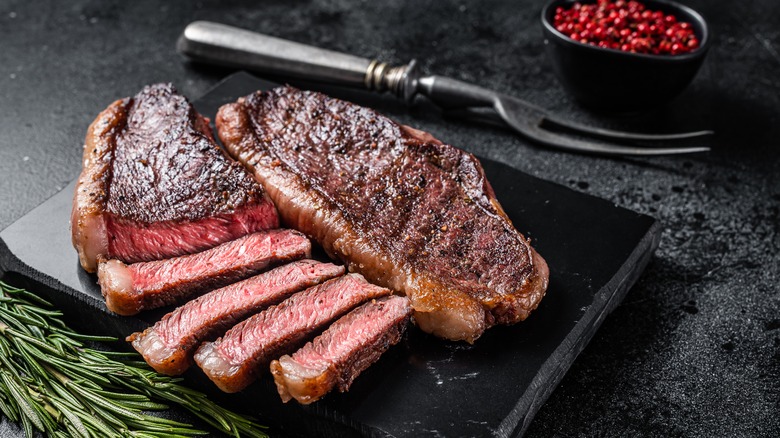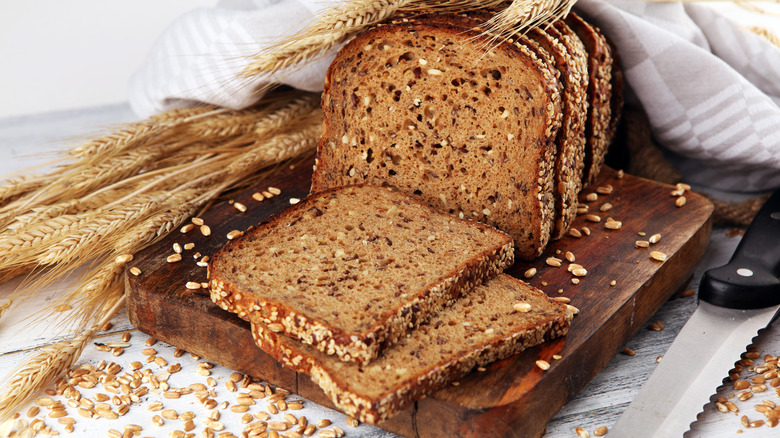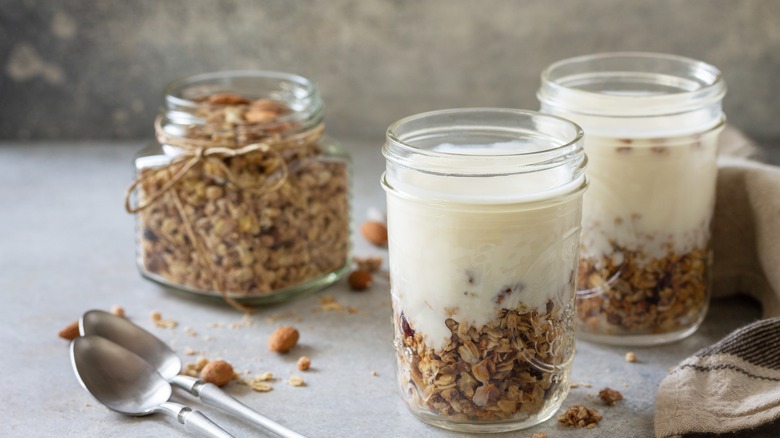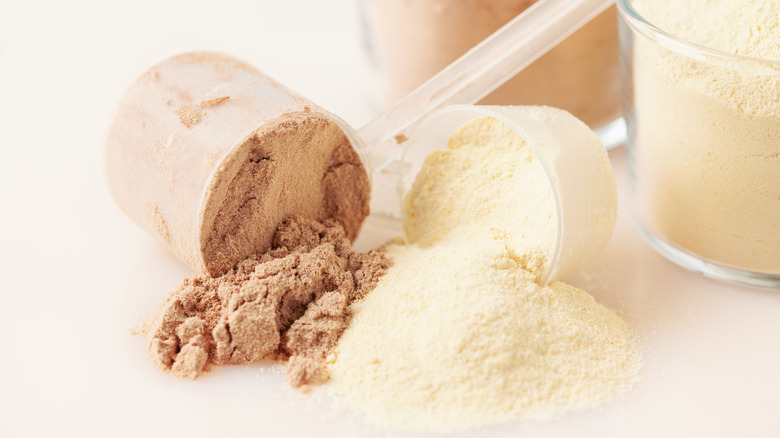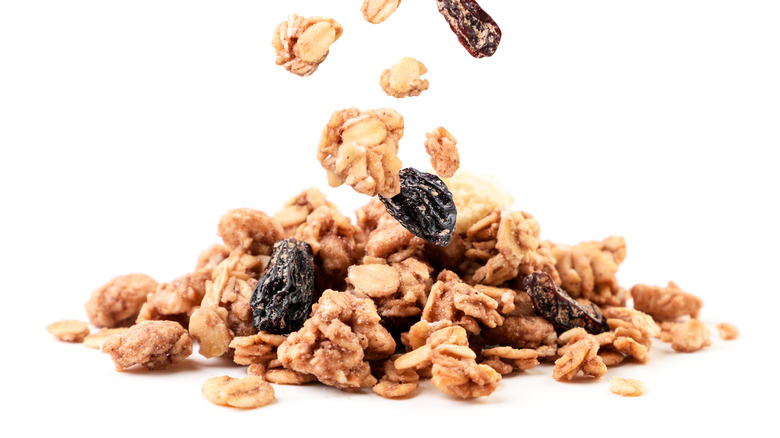Healthy Foods To Help With Weight Gain
While most discussions about weight gain tend to be on the preventative end of the spectrum, there are in fact those who want (or need) to gain weight for health reasons, or perhaps just aesthetic purposes. Healthline explains that despite the fact a whopping 74% of Americans classify as overweight or obese, a considerable segment of the population is underweight, meaning their body mass index (BMI) falls below 18.5. Reasons for being underweight range from genetic predisposition to a high metabolism, malnutrition, or health conditions. Furthermore, the site explains that people who are underweight have twice the risk of death than those who are obese. Some issues associated with being underweight include reduced immune function, increased risk of osteoporosis, and fertility concerns for women.
On the other hand, for those with a healthy BMI, packing on pounds of fat or muscle may simply be a way to change their physique. Increasing your calorie intake and creating what Healthline calls a "calorie surplus," which essentially means eating more calories than you burn, can be a fast way to gain weight. The good news is that this can be done with healthy, nutritious foods. Continue reading to learn about what to add to your diet if you want to slide up the scale.
Avocados
Avocados are a trendy food for a good reason. According to Healthline, avocados are actually a type of berry, and while they are oftentimes incorporated into savory dishes, they technically classify as a fruit. Avocados contain a large number of vitamins and minerals, as well as a healthy dose of monounsaturated fats, which is a type of healthy fat. They also provide a good number of calories per serving, offering 160 per 100 grams (or half an avocado), as well as 14.7 grams of fat. Another Healthline article shares that monounsaturated fats offer health benefits such as lowering your risk of heart disease, reducing your risk of cancer, and reducing inflammation to name a few.
Eating avocados can be as simple as slicing them up and eating them with a pinch of seasoning, but if you plan on getting the most out of this food, you may want to ... spice it up a bit. Experts at Healthline shares some healthy ways to eat avocadoes including "stuffing" them with an egg for breakfast, dicing them up in scrambled eggs, preparing guacamole, tossing them on top of a salad, and preparing sushi with them. Remember, if the intention is to increase your calorie intake, there's no need to be shy with serving size.
Eggs
Eggs are another all-around healthy food that can be incorporated into a weight gain plan. Eggs are heavy hitters in the weight gain department, and offer a high amount of both proteins and healthy fat, according to Medical News Today. They are also incredibly nutrient dense, which means that per calorie, they offer more vitamins and minerals than many other foods (via The Incredible Egg).
Regarding protein, experts at the site explain that one egg contains 6 grams of complete protein — meaning the protein contains the full complement of essential amino acids your body needs for peak functioning — per serving. Essential amino acids are amino acids that our bodies cannot make on their own (via Everyday Health). Among several tasks, one of the things that amino acids do is help our bodies build muscle. The amino acid leucine, for example, is one of the primary acids that helps us build muscle, and is not found in incomplete proteins. If gaining muscle is your intention, incorporating eggs into your diet may help you achieve that goal.
Olive oil
Olive oil, one of the primary staples in the Mediterranean diet, offers a number of health benefits that have been studied for centuries (via Mayo Clinic). Like avocados, olive oil is another source of monounsaturated fats, and offers many other beneficial elements such as antioxidants, vitamin E, and vitamin K, according to Medical News Today. The site explains that one tablespoon of olive oil provides 119 calories and 13.5 grams of fat, the majority of which is monounsaturated. When looking for olive oil to add to your diet, experts recommend choosing extra virgin olive oil versus non extra virgin, as it is less processed and therefore retains more of its nutritional value.
Livestrong dives more into the benefits of the monounsaturated fats found in olive oil and explains that this type of fat is actually good for your heart, as it reduces the amount of "bad" cholesterol found in your blood, which can cause both heart disease and stroke. Incorporating olive oil into your diet is relatively easy, as it can be your oil of choice when it comes to frying, baking, sautéing, or simply adding a drizzle to salads, cheese, or vegetables (via Medical News Today).
Dried fruit
If you are on the go and in a pinch, snacking on some dried fruit may add those extra calories you need to push you over the edge into your calorie surplus. According to Healthline, dried fruit is not only healthy for you, as its loaded with antioxidants and vitamins and minerals, but its also packed with calories. Part of what makes dried fruit so calorie-dense is its naturally high sugar content. Also, if you're worried that the dehydrating process will leech out nutrients from the fruit, not to worry: Both the fiber and nutrient content remain relatively intact, according to experts. In fact, a doctor at Harvard Health Publishing explains that per ounce, dried fruit actually contains more fiber and a certain type of antioxidant called phenols than fresh fruit. He encourages people to eat dried fruit, while making sure to stay away from those that have added sugar.
Medjool dates in particular are high in fiber and antioxidants, and offer approximately 130 calories for just two of them. You can eat dates on their own, or combine them with other high-calorie ingredients such as cheese or peanut butter. You can also add them to protein smoothies in place of sugar, as well as in salad dressings.
Salmon
Salmon is one of those all around healthy foods that is both delicious and feels somewhat indulgent. Whether farm raised or wild-caught, salmon has a number of nutritional benefits and is high in healthy fats, making it the perfect addition to your weight gain diet. According to Healthline, a serving of farmed salmon contains 206 calories, while a serving of wild salmon contains 182. Regarding protein, wild salmon beats out farmed salmon by 3 grams, containing 25 grams of it compared to the 22 grams found in farmed. Furthermore, a serving of farmed salmon contains 12 grams of healthy fat compared to 8 grams in fresh caught salmon.
One of the things salmon is most known for is its high quantity of omega-3 fatty acids, which is a type of nutrient that can only come from food. These omega-3 fatty acids can help decrease inflammation, lower blood pressure, lower the risk of cancer, and improve overall heart health.
For those who might not be a fan of fish with a strong fishy taste, salmon may prove to be a good alternative, as it has a more mild flavor. If you want to add more calories to your salmon, try pan frying it in olive oil, and perhaps putting it on top of a salad with other healthy fats, such as avocado.
Cheese
You may not have expected to see cheese on this list, but here it is. While cheese is often thought of as something to toss aside when developing a healthy eating plan, the current research says: not so fast. Healthline explains that while some cheeses are healthier than others, for the most part, cheese is a nutritious food that is filled with protein, calcium, and of course, much needed calories. On its list of healthiest cheeses, the site places mozzarella at the top. With origins in Italy, mozzarella cheese is typically made from either buffalo or cow's milk, and contains less sodium than other cheeses. One serving contains 85 calories, 6 grams of protein, and 6 grams of fat. Another major benefit of mozzarella is that it contains strains of probiotics called Lactobacillus casei and Lactobacillus fermentum, which serve to improve gut health and boost immunity.
Feta cheese is another tasty option that is often featured in the Mediterranean diet. This cheese is traditionally made from sheep or goat's milk, and is both salty and tangy in taste. It has 80 calories per serving, 6 grams of protein, and 5 grams of fat. To get the most caloric bang for your buck with feta, you can eat it on top of a salad drizzled with olive oil and olives, or mixed into your eggs.
Peanut butter
Peanut butter is one of the most versatile snack foods there is. Mix it into baked goods, whip it into smoothies, or smear it on top of toast — the options are limitless. Healthline explains that peanut butter is considered a calorie dense food due to its high fat content, which is good news for those who want to reach calorie surplus. A serving of peanut butter — which is two tablespoons — contains a whopping 191 calories. It also contains 16 grams of fat, 75% of which is unsaturated. And it is a high-protein food, which makes it great for building muscle.
In addition to its fat and protein content, WebMD explains that peanut butter is also an excellent source of vitamins and minerals including vitamin E, niacin, manganese, vitamin B6, and magnesium. The site further explains that one of the fats found in peanut butter called oleic acid is known to help promote good cholesterol, as well as improve blood sugar and blood pressure. One thing to note, though, is that some commercial brands of peanut butter include added sugar and other unhealthy ingredients, so it's best to find a brand that is all natural.
Nuts
Continuing with the theme, nuts are another great high-fat food to fold into your diet if you want to increase your caloric intake and gain weight (via The Healthy). Keith-Thomas Ayoob, a clinical associate professor at Albert Einstein College of Medicine in New York City, spoke to The Healthy and explained that almonds, walnuts, and pistachios in particular are worth including in your diet: "Almonds have a good dose of fiber, plus lots of heart-healthy unsaturated fats. The same for pistachios — and an ounce of either also gives you about 6 grams of protein, the same amount you would get in an egg. Walnuts are high in omega-3 fats, which are excellent for heart health."
Healthline concurs, and notes that one serving of pecans provides a hefty 201 calories, 21 grams of fat, and 3 grams of protein. They also provide a healthy amount of minerals like zinc, manganese, and vitamin B1. If you want to pack on even more calories, scoop up a handful of dried fruit alongside your handful of nuts for a quick and easy high-calorie snack.
Dairy milk
Good old-fashioned milk. While there may be some controversy around whether or not milk can be part of a healthy diet, there is, in fact, plenty of research that supports its inclusion. According to Medical News Today, milk is a considerable source of calcium, protein, and, vitamin D, all of which are essential. Furthermore, Healthline reports that milk is famously known for helping to build muscle and gain weight, and has been used this way for decades. Milk offers the perfect trifecta of proteins, carbs, and fat, and its high content of casein and whey protein make it an excellent option for those who want to build muscle, specifically when lifting weights.
Medical News Today says that one cup of full-fat milk contains 149 calories, 7.9 grams of fat, and 7 grams of protein. It might seem obvious, but its probably best to skip skim (fat free) milk if you want to pack on calories, as one cup of skim milk only contains 82 calories and .2 grams of fat. In addition to its caloric content and high protein, milk is a significant source of calcium, which can help improve bone health, prevent blood clotting, and maintain healthy blood pressure.
Red meat
For all you steak lovers out there, good news: Red meat is one of the best foods out there to help you gain weight quickly. According to Medical News Today, research has proven red meat to be effective in helping people gain both muscle and weight. Red meat contains both leucine and creatine, which are widely known to help build muscle mass. As mentioned, leucine is an amino acid found in complete proteins. According to Mayo Clinic, creatine is another amino acid that is typically found in the muscles and brain, and people source most of their creatine from either seafood or red meat. The muscles use creatine as a source of energy, which can help people enhance athletic performance, leading to potential muscular gains.
Furthermore, red meat contains fat, which is helpful when trying to up your caloric intake. Per Healthline, one serving of 80% lean ground beef contains 287 calories, 19 grams of protein, and 23 grams of fat. Furthermore, ground beef is a good source of micronutrients, providing 101% of the daily value of vitamin B12 per serving, 43% of the daily value of zinc, and 30% of the daily value of niacin. That said, how the cows are raised can have an effect on the nutritional value of the meat — for instance, grass-fed beef typically contains more omega-3 fatty acids and less saturated fat than grain-fed beef.
Whole grains
A slice of whole grain toast in the morning can be a delicious and calorie-dense way to start the day. Healthline explains that while there are plenty of popular diets these days that suggest limiting the intake of grains (the paleo diet, for example), whole grains can actually be a healthy part of your diet. If you've heard bad things about grains before, it's likely refined grains that you were hearing about. Whole grains, on the other hand, provide a number of positive side effects for your health including decreasing your risk for diabetes and heart disease, and lowering your blood pressure.
Whole grains such as bread, oatmeal, and brown rice are abundant in fiber, vitamins, minerals, antioxidants, and even protein. According to Verywell Fit, one slice of whole wheat bread contains 80 calories, 3 grams of fiber, 20 grams of carbohydrates, and 5 grams of protein. Whole wheat bread in particular can help improve your digestion due to its high fiber content, and may even help lower your risk of diabetes as a result of both its fiber and magnesium. To get the most calories out of your morning slice of toast, try drizzling it with olive oil or topping it with cheese or avocado (or both!) for a well-rounded meal.
Yogurt
Yogurt is another quick snack for people who are on the go and looking for a no-brainer source of calories. Medical News Today explains that yogurt is fermented milk that has been treated with a yogurt culture. Like milk, it is a significant source of protein and fat, and also provides calcium. Another major reason people consume yogurt is for its high content of probiotics, which are a certain type of bacteria that are beneficial for gut health and aid in digestion. If you're looking to gain weight, it's probably best to stick with full-fat varieties (via Healthline).
It's important to remember, though, that not all yogurt is created equal. While some sugar is naturally found in yogurt, yogurt companies may add a lot of extra sugar, artificial sweeteners, or other non-natural ingredients that could be harmful to your health (via Medical News Today). Look for brands that contain no artificial sweeteners and that have less than 15 grams of sugar per serving to be safe. Greek yogurt is a particularly protein-rich type of yogurt that contains a whopping 20 grams of it per serving. Try topping Greek yogurt, or any yogurt, with dried fruit and nuts to get the most out of your snack.
Whey protein powder
There's a reason that protein powder is so popular among gymgoers. One particular type called whey protein powder is made when a liquid protein called whey separates from milk during the production of cheese. What's left is a complete protein, and what Healthline calls "one of the best dietary sources of protein available." It's considered a supplement, and is regularly used by weightlifters and those who want to easily incorporate more protein into their diets. There are three types of whey protein: concentrate, isolate, and hydrolysate.
Among the benefits of consuming whey protein, one of the first Healthline lists is its ability to help you gain muscle, as it contains high quantities of the amino acid leucine. As we age we tend to lose muscle mass, and including a complete protein like whey into our diets can help slow down the loss of muscle when combined with strength training exercises. In fact, whey protein in particular may be better at improving muscle mass than other proteins such as soy and casein. Whey protein powder comes in a number of flavors that can be easily blended into smoothies, added to yogurt, or simply shaken up with water.
Granola
Granola is another delicious healthy snack that is both calorie- and nutrient-dense, according to Healthline. Ways to prepare granola are essentially endless, but it is typically presented as a combination of toasted oats with the addition of nuts, dried fruit, and a variety of other add-ons. It may be sweetened with sugar, maple syrup, or honey. While it can be a healthy snack, experts explain it's important to be on the lookout for saturated oils and other unhealthy fats and sugars that can be added.
As mentioned, granola is incredibly calorie-dense. For example, one serving of "Gypsy Crunch Roasted Granola" alone contains 260 calories. Granola is also high in protein and fiber, and those that contain nuts and nut butter tend to be higher on the protein front than those with dried fruit. Additional benefits of eating granola include its ability to lower blood pressure and reduce cholesterol due to its high fiber content, as well as improving your gut health. For those who partake in workouts such as hiking, snacking on a bag of granola is an easy way to regain energy and get a protein boost on-the-go.

